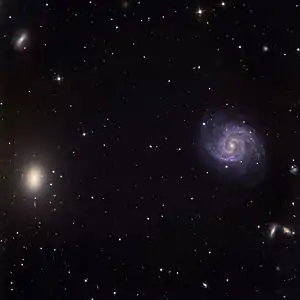NGC 1052
NGC 1052 is an elliptical galaxy in the constellation Cetus.
| NGC 1052 | |
|---|---|
 NGC 1052 (center left) and NGC 1042 (center right) as imaged by Schulman Telescope Credit: Adam Block/Mount Lemmon SkyCenter/University of Arizona | |
| Observation data (J2000 epoch) | |
| Constellation | Cetus |
| Right ascension | 02h 41.1m [1] |
| Declination | −8° 15′ 21″[1] |
| Apparent magnitude (V) | 12.1[1] |
| Characteristics | |
| Type | E4[1] |
| Apparent size (V) | 3.0′ × 2.1′[1] |
Features
NGC 1052 is located at a distance of around 63 million light years from the Milky Way,[2] and has a LINER-type active galactic nucleus which signals the intense starburst activity in the galaxy's center[3] that were confirmed with observations with better resolution showing a number of star-forming regions and young star clusters.[4]
NGC 1052 shows also two small jets emerging from its nucleus as well as a very extended disc of neutral hydrogen, far larger than the galaxy itself,[5] all these features suggesting a gas-rich galaxy collided and merged with it 1 billion years ago producing all the above features.[4]
A scale image of NGC 1052 and its satellite galaxies is available at the reference.[6]
Central black hole
NGC 1052 hosts a rapidly rotating supermassive black hole with a mass of 154 million M☉[7] with a large magnetic field of between 0.02 and 8.3 Tesla, which, according to PhD student Anne-Kathrin Baczko, the leader of the team that made this discovery, provides enough magnetic energy to power the previously mentioned twin relativistic jets.[8]
The location of this black hole is the most precisely known in the universe, with the exception of Sagittarius A*, the supermassive black hole found at the heart of our own galaxy.[8]
See also
- NGC 1052-DF2, a galaxy assumed to be associated with NGC 1052, and which appears to have little or no dark matter
- NGC 1052-DF4, another galaxy assumed to be associated with NGC 1052, and which appears to have little or no dark matter[9]
References
- "NASA/IPAC Extragalactic Database". Results for NGC 1052. Retrieved 2013-12-21.
- J. L. Tonry; A. Dressler; J.P. Blakeslee; E.A. Ajhar; A.B. Fletcher; G. A. Luppino; M. R. Metzger; C.B. Moore (2001). "The SBF Survey of Galaxy Distances. IV. SBF Magnitudes, Colors, and Distances". Astrophysical Journal. 546 (2): 681–693. arXiv:astro-ph/0011223. Bibcode:2001ApJ...546..681T. doi:10.1086/318301. S2CID 17628238.
- Pierce, Michael; Brodie, Jean P.; Forbes, Duncan A.; Beasley, Michael A.; Proctor, Robert; Strader, Jay (2005). "The evolutionary history of the elliptical galaxy NGC 1052". Monthly Notices of the Royal Astronomical Society. 358 (1): 419–431. arXiv:astro-ph/0501066. Bibcode:2005MNRAS.358..419P. doi:10.1111/j.1365-2966.2005.08778.x. S2CID 16977888.
- Fernández-Ontiveros, J.A.; López-Sanjuan, C.; Montes, M.; Prieto, M. A.; Acosta-Pulido, J.A. (2011). "The most recent burst of star formation in the massive elliptical galaxy NGC 1052". Monthly Notices of the Royal Astronomical Society Letters. 411 (1): L21–L25. arXiv:1011.2498. Bibcode:2011MNRAS.411L..21F. doi:10.1111/j.1745-3933.2010.00985.x. S2CID 119232954.
- "Notes for NGC 1052". NED. Cal Tech.
- Dokkum, Pieter. "image of NGC 1052". twitter.
- Brenneman, L. W.; Weaver, K. A.; Kadler, M.; Tueller, J.; Marscher, A.; Ros, E.; Zensus, A.; Kovalev, Y.Y.; Aller, M.; Aller, H.; Irwin, J.; Kerp, J.; Kaufmann, S. (2009). "Spectral analysis of the accretion flow in NGC 1052 with Suzaku". The Astrophysical Journal. 698 (1): 528–540. arXiv:0903.3583. Bibcode:2009ApJ...698..528B. doi:10.1088/0004-637X/698/1/528. S2CID 464273.
- "Twin jets pinpoint the heart of an active galaxy". phys.org. Retrieved 1 April 2018.
- Van Dokkum, Pieter; Danieli, Shany; Abraham, Roberto; Conroy, Charlie; Romanowsky, Aaron J. (2019). "A Second Galaxy Missing Dark Matter in the NGC 1052 Group". The Astrophysical Journal. 874 (1): L5. arXiv:1901.05973. Bibcode:2019ApJ...874L...5V. doi:10.3847/2041-8213/ab0d92. S2CID 102486855.